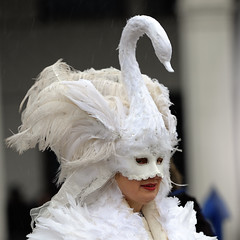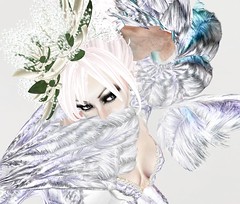 Beatriss has felt a growing antipathy toward Khanbaliq— the constant noise of construction, destruction, and more construction, the draft in her, too-bright room, the odors of moldering food, of the smoke, sewage, and sweat of so many unknown people. And so she went to the Forbidden City to visit Tetsukichi’s fiancée Su-Laing. As she looked forward to her wedding, Su-Laing also resented the feeling of the city closing around her. Rather than shuffle around a palace in slippers, she wanted to charge a horse across the steppes. So it was agreed, Su-Laing would ask to be married at a sacred spot on the plain of horses, surrounded by all the members of her clan. And Beatriss of course would go with them.
Beatriss has felt a growing antipathy toward Khanbaliq— the constant noise of construction, destruction, and more construction, the draft in her, too-bright room, the odors of moldering food, of the smoke, sewage, and sweat of so many unknown people. And so she went to the Forbidden City to visit Tetsukichi’s fiancée Su-Laing. As she looked forward to her wedding, Su-Laing also resented the feeling of the city closing around her. Rather than shuffle around a palace in slippers, she wanted to charge a horse across the steppes. So it was agreed, Su-Laing would ask to be married at a sacred spot on the plain of horses, surrounded by all the members of her clan. And Beatriss of course would go with them. href="http://www.flickr.com/photos/lilith-ivory/2387846636/">Bird Song
href="http://www.flickr.com/photos/lilith-ivory/2387846636/">Bird SongOriginally uploadeddddddddddddddddddddddddddddddddddddddddddddddd by Lilith Ivory
In the meantime, Su-Laing’s family was hosting a party that night . . . would Beatriss like to attend? The draw of the party was an appearance by the Swan Lady—a very pale woman wearing wings constructed of white feathers and a mask. Everyone marveled at the singular way that she sang and danced, and at the incredible paleness of her face, her neck, and limbs. Beatriss recognized her as a Cynadecia; like most of the people she remember, the woman was half-oblivious to the people gawking at her and seemed to believe that she was a swan. Making inquiries over the next few days, she learned that the Swan Lady belonged to a wealthy merchant who lived somewhere in the Green Zone. Her questions generated a lot of reciprocal curiosity since Beatriss was also from Cynadecia, and despite her efforts to conceal it, also had oddly pale skin.
There was a second mystery as well. Cair, an explorer from “distant lands” living in luxurious captivity as a special guest of the Emperor, visited Beatriss to tell her he’d heard some strange things about her friend Gwinch. He had allowed a woman from the monastery outside the city to not only join his meditation hall, but to replace him as its leader. He’d surrendered his private quarters to live among the other junior monks. And most recently, he had disappeared completely. Deflecting Cair’s worries, Beatriss went to see for herself. The woman—Sheevani—explained that Gwinch had performed well at the komite. The ultimate victor, Sensei Luche, invited Gwinch to study at his monastery for a couple months. Sheevani was managing his meditation hall until he returned. Satisfied by this explanation, and generally comforted by Sheevani’s demeanor, Beatriss asked if she herself might move into the compound—Sheevani welcomed her.
After a few days living on the compound, Beatriss accepted Sheevani’s invitation to participate in the evening studies conducted at meditation hall. She accepted the invitation. What she saw made her rethink Cair’s insinuations regarding the “changes” that had happened in Gwinch’s absence. Besides the ample supplies of food and beer, what surprised her most was that the religious instruction was provided by young women who, while wearing monks’ robes, did not show advanced understanding. The samurai, however, were very attentive when they read from the sacred texts.
Beatriss asked Sheevani for an escort and guide and went to visit Gwinch at the monastery of Sensei Luche, two hours away from the city. She was welcomed there and she met Gwinch. Gwinch confirmed Sheevani’s explanation of his whereabouts. Gwinch knew about the evening studies—he had brewed the beer. As long as the money was collected by donation, he was ok with it. On the way home, Beatriss and her companions spied a white crane standing in a large pond. The monks stood in silence and watched the bird until it flew away. For the rest of their journey home, Beatriss heard the monks whispering that the grace of a crane, while less obvious than that of a swan, was ultimately more beautiful, at least to a man of enlightenment and understanding.
After a few days living on the compound, Beatriss accepted Sheevani’s invitation to participate in the evening studies conducted at meditation hall. She accepted the invitation. What she saw made her rethink Cair’s insinuations regarding the “changes” that had happened in Gwinch’s absence. Besides the ample supplies of food and beer, what surprised her most was that the religious instruction was provided by young women who, while wearing monks’ robes, did not show advanced understanding. The samurai, however, were very attentive when they read from the sacred texts.
Beatriss asked Sheevani for an escort and guide and went to visit Gwinch at the monastery of Sensei Luche, two hours away from the city. She was welcomed there and she met Gwinch. Gwinch confirmed Sheevani’s explanation of his whereabouts. Gwinch knew about the evening studies—he had brewed the beer. As long as the money was collected by donation, he was ok with it. On the way home, Beatriss and her companions spied a white crane standing in a large pond. The monks stood in silence and watched the bird until it flew away. For the rest of their journey home, Beatriss heard the monks whispering that the grace of a crane, while less obvious than that of a swan, was ultimately more beautiful, at least to a man of enlightenment and understanding.
No comments:
Post a Comment